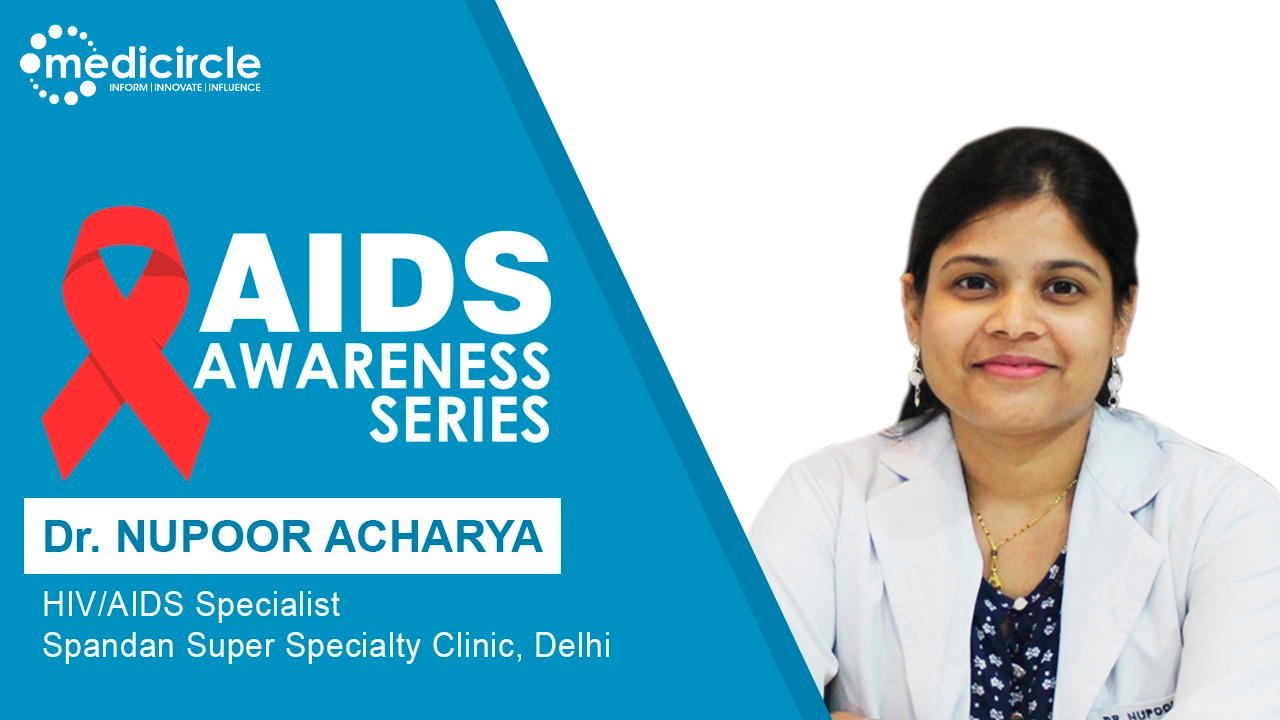Dr. Nupoor Acharya has done MBBS, MD, DM, (Clinical Immunology and Rheumatology) from PGIMER, Chandigarh. She is currently practicing as a Consultant Immunologist and Rheumatologist at Bombay Hospital, Indore. She has 8+ years of experience. She is trained in treating various immune-mediated and Rheumatologic Diseases and has numerous publications in national and international journals.
Difference between HIV and AIDS
Dr. Nupoor says, “HIV and AIDS are two separate things. HIV is a virus that causes AIDS. When a person is infected with HIV, the virus attacks the immune cells of the body, destroys them, and gradually weakens the immunity. This makes the person vulnerable to normal infections present in the environment, increasing the chance of developing serious infections. The advanced stage of HIV infection is termed AIDS. In AIDS, the person is more likely to develop severe cancers like blood cancer. All these groups of diseases can be life-threatening. There are misconceptions and social stigma regarding AIDS that needs to be eradicated.”
HIV through needles
Dr. Nupoor expresses, “There are various routes of transmission of HIV infection. Unprotected sexual intercourse is the most common. The second most common is blood transfusion and infected needles. Generally, people who are addicted to drugs, take drugs through needles. The same needle is shared between multiple people. If this needle is used by an infected person and shared multiple times, then there are high chances that others will also get the infection. Thus, IV drug use is a major concern for infections like HIV, hepatitis B & C.”
HIV through Pregnant mother to baby
Dr. Nupoor explains, "In case of a pregnant woman, the mother's blood mixes with the child's blood through placenta. So, if the mother has an HIV infection, there are chances that the child will also be infected. Therefore, HIV testing is mandatory for all pregnant mothers. And in case the pregnant mother is found to be HIV positive, still, we can prevent the transmission of infection to the child through
1. Initiating early treatment with medicines. Pregnant mothers are given only those medicines that are safe in pregnancy. Medicines are capable of bringing the viral load to almost negligible, thus preventing the rate of transmission.
2. Delivery is done through C-section
3. Medicine is also be given to the baby right after the birth
4. If possible, mothers should avoid breastfeeding the baby, and can give formula milk.
Get tested and treated as soon as you get detected.”
HIV via insect bite
Dr. Nupoor clears, “There is no scientific evidence that HIV is transmitted through insect bites. It's a total misconception. HIV cannot get transmitted through an insect bite.”
Valuable message
Dr. Nupoor concludes, "AIDS is not the end of life. Treatment available nowadays can give you life expectancy as a normal person. So, if you have been detected with HIV, don't panic, you can get help from multiple Govt centers where treatments are free of cost. Start your treatment as early as possible. Even if you doubt that you have contracted the infection, do not hesitate to get yourself tested. You can visit the nearby ART center for the test. Get tested and treated.”
(Edited by Renu Gupta)

 Get a deeper knowledge of different modes of HIV infection and debunk some common myths related to HIV from experienced Dr. Nupoor Acharya.
Get a deeper knowledge of different modes of HIV infection and debunk some common myths related to HIV from experienced Dr. Nupoor Acharya.










.jpeg)



.jpeg)
.jpeg)

.jpeg)


.jpeg)



.jpeg)
.jpeg)
.jpeg)


.jpg)

